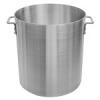OP: what you've listed as long terms indeed sound like short term solutions which are likely to occur for any single complaint (depending on severity).
When you want to discuss long term, it would start with a trend analysis of what complaints you're seeing. We have our customer service department categorize complaints and rejections into categories (temperature, damage packaging, packaging errors, illness, so on and so forth). We trend the complaints monthly for each of our production facilities, but take a deeper dive at a corporate level to identify plants with higher numbers of complaints, whether a category is recurring at an unacceptable frequency, etc. Any trends that emerge can trigger independent corrective and preventative actions to be taken.
Now, you may review your complaints and find no outstanding trends. You can write it up as such at that time, identifying no long term corrections need to take place. But if you review say, 12 months worth of your complaints, and one glaring type or situation emerges as a significant part of your complaints, then that would be worth performing a full investigation and identifying what changes you can make to prevent it from recurring. Then implement those changes and look for effectiveness via your next trend review.












